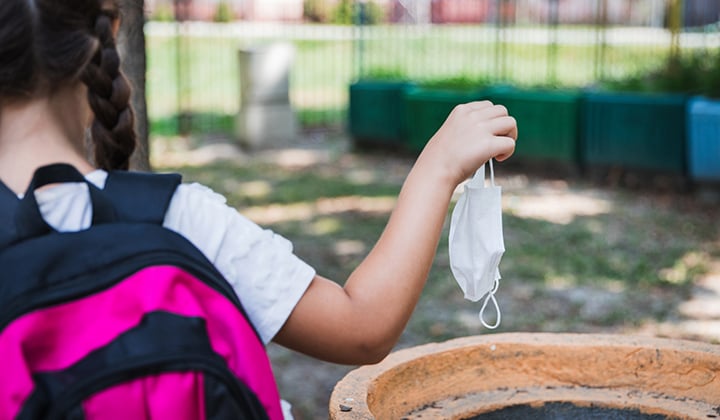
We have all been through a rough time these past two years of the COVID-19 pandemic. When you look at everything that has happened, and everything that has changed, there is no doubt that COVID-19 has left a lasting impact. As we look forward to returning to normal activities and unmasking, please keep in mind the importance of kindness during this time of transition.
COVID-19 created psychological trauma
Trauma is a word people often don’t think applies to themselves. A trauma can be any experience that overwhelms a person’s ability to cope. The COVID-19 pandemic caused many deaths, insecurity for work, fear and disruption to everyday life, leaving a wake of psychological trauma. It can help to recognize the stress and grief many people experienced. Understanding this can help us appreciate the choices other people are making.
The many reasons people are still masking
Many cities, counties, and businesses offer guidance that differs from the CDC masking guidance. Some people are vaccinated, while others are not or are not eligible, and it can create confusion about what to do and who should wear masks. Although many people are choosing to unmask, there are many reasons why people want to continue masking.
- Protecting others: Some people have additional health risks or a loved one at home who may be more vulnerable if they contract COVID-19. Many people also have young children who are not yet eligible to get the COVID-19 vaccine. Health care workers are still providing care to children and adults who need to be protected from getting exposed to COVID-19 and other illnesses.
- Breakthrough cases: COVID-19 variants are still present and breakthrough cases can happen. Wearing a mask can be very helpful in reducing the risk of getting COVID-19.
- Proven way to reduce the spread of other viruses: Throughout the year, influenza, colds and other viruses are being spread. Some people may want to protect themselves against other spreadable germs and stay healthy by wearing a mask.
- Travel protection: Many people wear masks to ensure they don’t miss work and travel plans by falling ill.
Kindness during an uneasy time
Regardless of your decision on whether or not your family will continue to wear a mask in public, it is important to model kind behavior for your children. They need to understand why your family is continuing to mask or not, and that it is OK for other families to make a different choice.
Here are some trauma-informed ways to help understand those who choose to keep masking.
- Acknowledge your own experience. It can help to understand what you have experienced first. Think through the past few years and consider if this time was difficult in any way, if you experienced unexpected losses or worry. This may help to create space for compassion.
- Seek to understand. Human nature often has us wanting to be understood first, rather than first understanding others. Try to understand the other person’s point of view and rationale, even when different than your own.
- Promote safety. Pay attention to body cues, like keeping physical distance. Some people may still want to keep masking, maintain physical distance and use extra hygiene practices to stay healthy.
- Build trustworthiness. Building rapport can help people feel at ease. Ask open-ended questions to further understand their perspective. Seek common ground by asking them what they want and what worries them.
Agree to disagree
In some cases, you may feel there is nothing you and someone with the opposite opinion could agree on. But there are ways to create mutual understanding.
- Agree on a truth. I know we all want what is best for our families. COVID-19 has been very difficult on us all.
- Agree on a principle. I believe every person should feel safe and protected.
- Agree with the likelihood. It is likely that people also just want to get back to normal.
If you are in a conversation about masking where you can’t agree, then you can agree to disagree, respectfully. Keeping kindness, compassion and understanding at the forefront of your words will help to end the conversation peacefully. Remember, from a trauma-informed perspective, we recognize that it’s not what’s wrong with you, but what’s happened to you… Because it’s true, we probably all want to return to normal, but for some people, normal may not be the same ever again.
